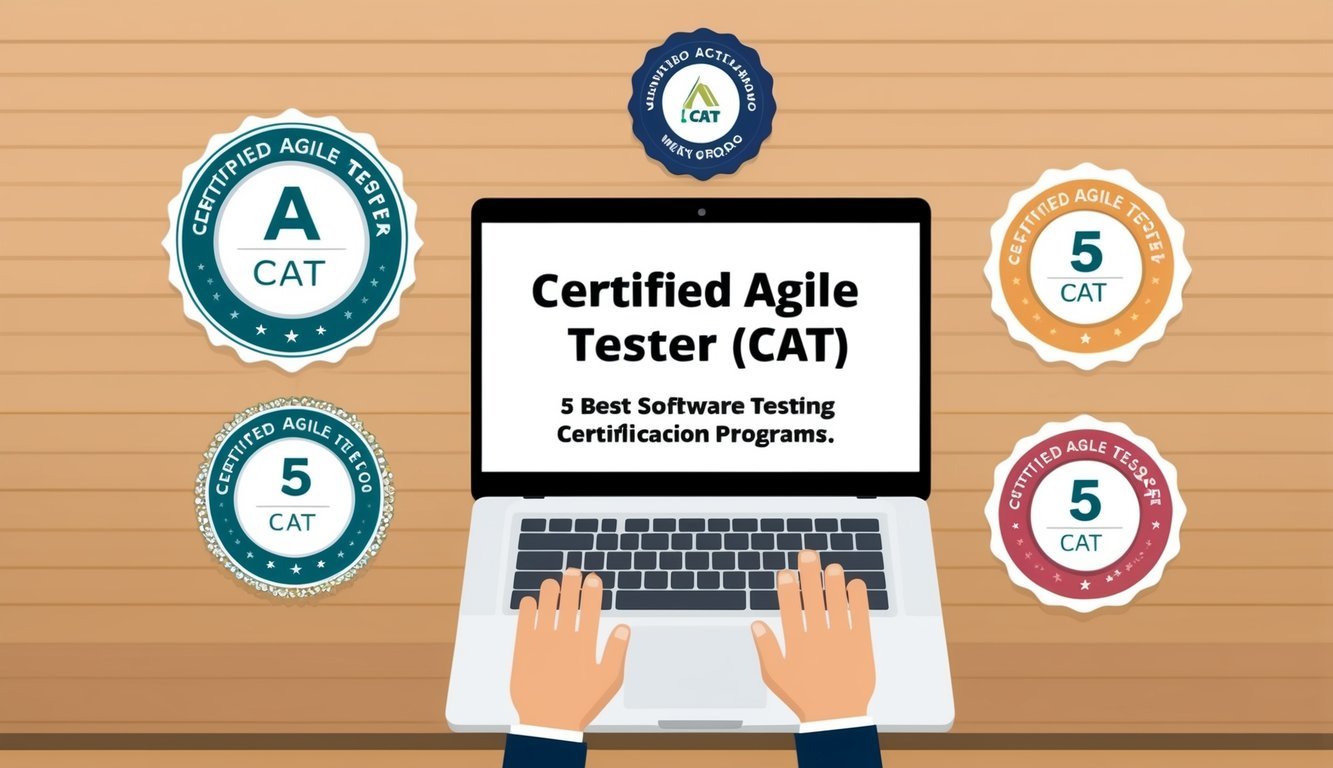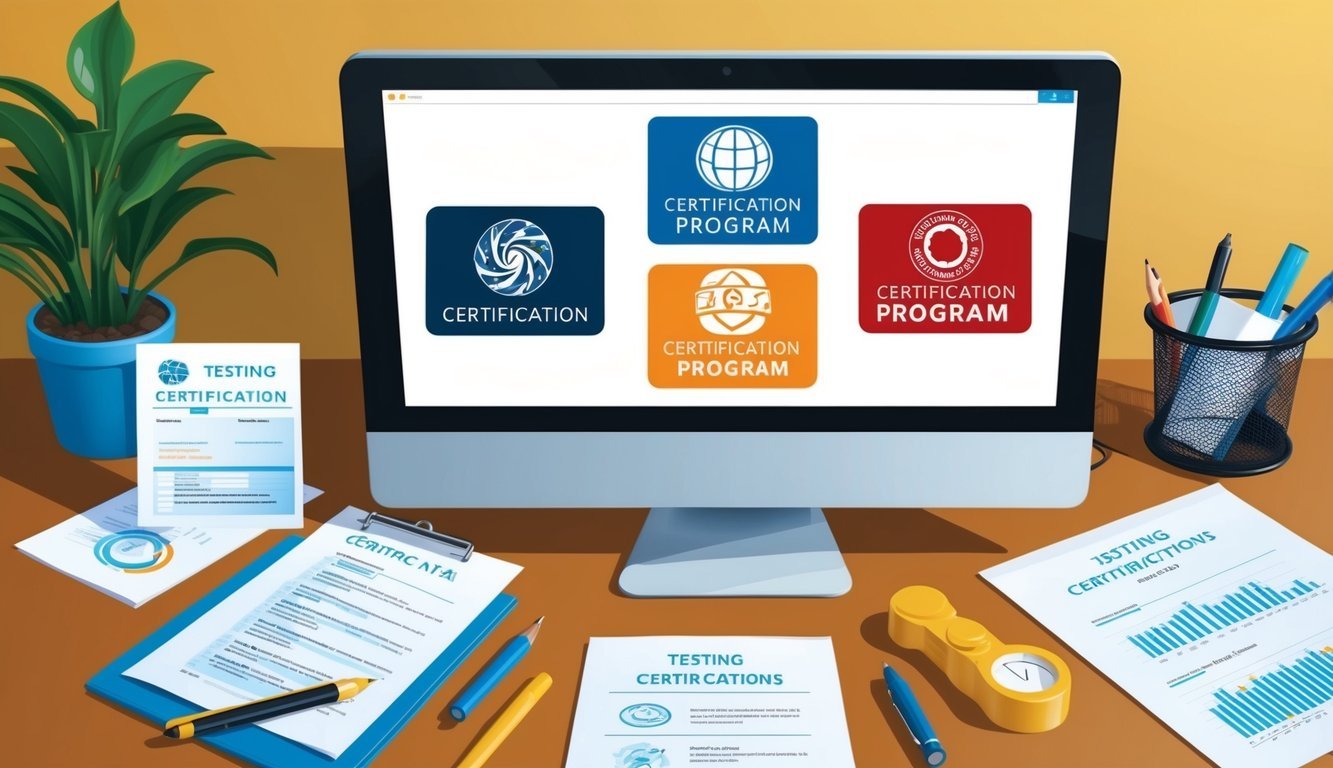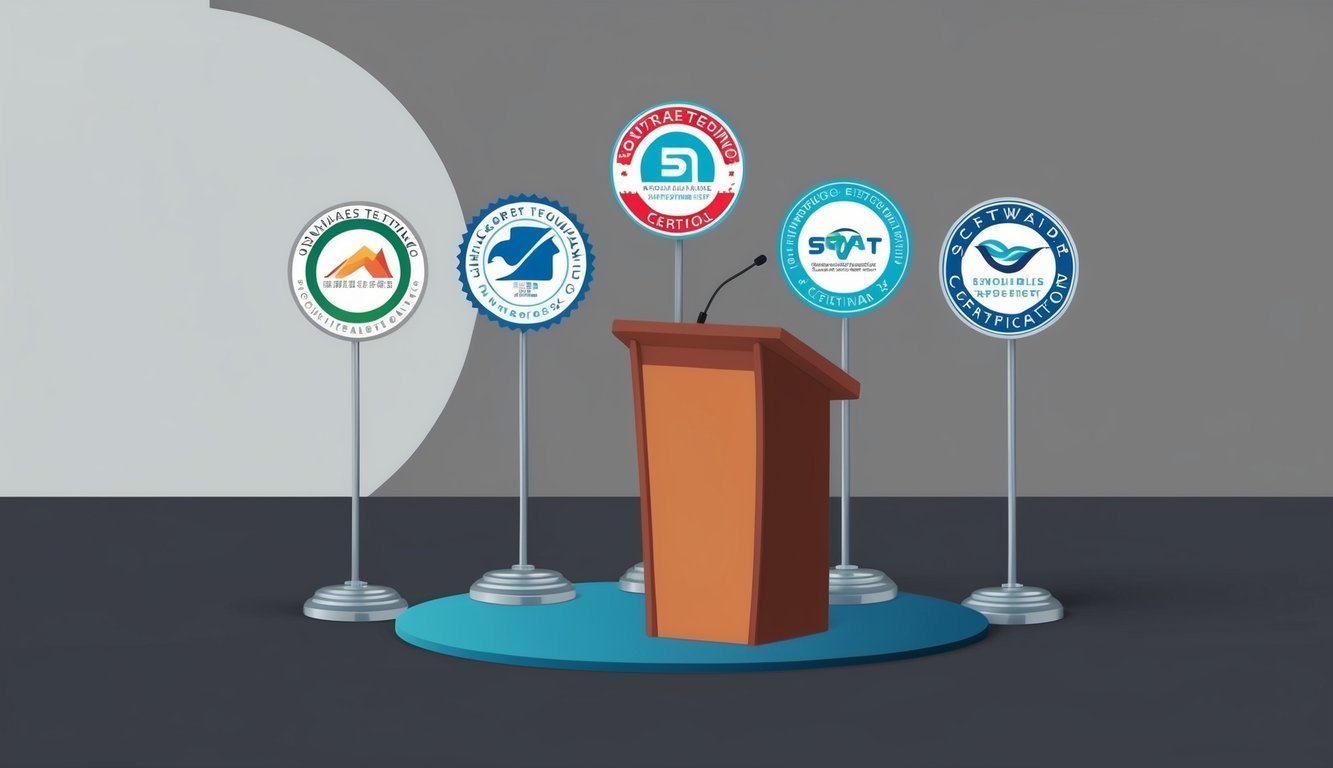Thinking about a software testing certification? It could be the boost your career needs! These programs equip you with vital skills and tell potential employers, “Hey, I know my stuff!” They can lead to better jobs and, let’s be real, a fatter paycheck.

There are plenty of software testing certifications to choose from. Some are designed for beginners, while others are tailored for seasoned professionals.
Each one zooms in on different aspects of testing.
Let’s break down five of the top choices to help you find your fit.
1) ISTQB Foundation Level
If you’re ready to kickstart your software testing adventure, look no further than the ISTQB Certified Tester Foundation Level (CTFL).
This widely recognized entry-level certification is perfect for anyone stepping into the world of software testing.
You’ll build a strong foundation in testing concepts and practices, discover the tester’s role in software development, and get to grips with key testing principles.
Whether you’re a tester, test analyst, or even a developer looking to sharpen your testing skills, this certification is a fantastic choice.
And the best part? It’s recognized around the globe, opening the door to exciting job opportunities as you advance your career.
To earn your certificate, you’ll need to pass an exam.
But don’t sweat it! There’s a treasure trove of resources available—study materials, practice tests, and online courses aplenty.
Keep in mind, getting certified is just the starting line.
The real magic happens when you apply what you’ve learned on the job.
2) Certified Agile Tester (CAT)

Do you want to show off your skills in Agile testing? The Certified Agile Tester (CAT) certification might be just the right ticket for you.
It’s ideal if you’re working in or thinking about joining Agile teams.
This program dives into how testing integrates into Agile processes, teaching you essential Agile principles to apply to your work.
Employers appreciate this certification because it proves you can thrive in fast-paced Agile environments.
To get certified, you’ve got to tackle both a written and a practical exam.
Don’t worry—the course includes hands-on training to help you gain real-world experience.
Once you’ve got your CAT, you’ll grab attention in the job market.
Many companies are diving into Agile, so this certification could be your golden ticket.
Staying updated with Agile practices is crucial, and the CAT certification will keep you sharp and ready to tackle new challenges.
3) Certified Software Tester (CSTE)
Want to elevate your testing skills? The Certified Software Tester (CSTE) could be the right choice for you.
This certification is a great way to prove your expertise in quality control within the software testing realm.
CSTE sets the bar high right from the get-go.
It charts a clear path for you as you dive deeper into the testing world.
You’ll explore fundamental testing concepts and methodologies, with a strong emphasis on quality control—a must-have in today’s software landscape.
This certification typically requires some prior experience.
A college degree or relevant work experience is usually required before you can take the test.
Study materials are easy to find online, and you can choose to enroll in a course that covers everything you need.
Expect to pay between $150 and $270 for the exam, depending on your membership status.
Earning a CSTE sends a strong message to employers that you’re serious about your testing career.
It’s a stylish entry onto your resume, making you stand out in the competitive job market.
4) Certified Test Manager (CTM)
Ready to elevate your software testing career? The Certified Test Manager (CTM) program, offered by the International Institute for Software Testing (IIST), focuses on essential test management strategies.
This certification is perfect for experienced testers aiming for leadership roles.
You’ll learn to plan, coordinate, and oversee testing projects effectively from start to finish.
The CTM course covers a broad array of topics, including test strategy development, risk management, and team leadership.
Plus, you’ll get the lowdown on budgeting and resource allocation for testing projects.
To earn your certification, you’ll have to pass an exam designed to assess your grasp of key concepts and your practical application skills.
It shows companies you’ve got the chops to lead testing teams and manage complex projects with confidence.
If you’re aiming for a senior role in software testing, pursuing the CTM certification could be your ticket to new opportunities and marked career growth.
5) Advanced Level Test Analyst

Ready to take your software testing game to the next level? The Advanced Level Test Analyst certification might just be the leap you need.
This program targets professionals who have a bit of experience under their belt.
Ideal for software testers, engineers, and automation experts eager to solidify their skills.
You’ll dive into structured and comprehensive software testing approaches and discover the test analyst’s role at each step of the testing process.
This certification covers essential test techniques, ensuring you can design, execute, and oversee testing activities with flair and efficiency.
The exam fee is $250, which isn’t too bad for the career boost it offers.
Employers will definitely value the skills and knowledge you bring to the table.
Want to show you’re a top-tier test analyst? This certification is a smart move that could lead to better job prospects and potentially higher pay.
The Importance of Software Testing Certifications

Getting certified in software testing isn’t just about boosting your resume; it can enhance your professional credibility and career prospects significantly.
It demonstrates to employers that you’re serious about your expertise in the field.
Career Advancement
Software testing certifications can help you scale the career ladder faster, leading to better job options and higher salaries.
Many companies prefer hiring certified testers.
You’ll acquire new skills that add to your value at work, which could lead to promotions or new roles.
For instance, the ISTQB Advanced Level Test Analyst certification is ideal for mid-level testers ready to elevate their career.
Plus, certifications help you keep up with the latest testing trends—something that’s critical in today’s fast-evolving tech world.
You’ll feel ready to tackle whatever new challenges come along.
Professional Credibility
Holding certifications sets you apart from other candidates.
It’s like saying, “I’m dedicated to my profession and know what I’m doing.”
Employers have more trust in certified testers because they know you’ve been trained to meet high industry standards.
This certainly gives you a leg up in interviews and project assignments.
Your certification demonstrates your ability to handle complex testing tasks—it’s like a stamp of approval from industry experts.
Colleagues and clients will trust your skills more, which is a big win.
Some certifications, like the Professional Scrum Developer Certification, showcase your understanding of crucial processes that many companies seek in their teams.
Choosing the Right Certification Program

Picking the right software testing certification can be a game changer for your career.
It’s important to choose a program that aligns with your career goals and is respected in the industry.
Aligning with Career Goals
What’s your career focus? Just starting out? The ISTQB Foundation Level could be the perfect match.
It covers the basics and is fantastic for newcomers.
Want to narrow it down to something specific? Check out specialized certifications.
If automation’s your thing, the Selenium Certification might be right up your alley.
Interested in security testing? The Certified Ethical Hacker (CEH) could be just what you’re after.
Already have some experience? Consider advanced certifications.
The ISTQB Advanced Level Test Analyst is a fine fit for seasoned pros ready to rise.
Considering Program Reputation
Look for certifications that carry weight with employers.
The ISTQB certifications, for example, are recognized around the world.
They’re a solid choice for almost any tester.
Check out job listings in your area to see which certs pop up the most.
This can help steer you toward a certification that local employers value.
Don’t hesitate to reach out to fellow testers.
Join online forums or attend local meetups for real feedback on different programs.
Investigate the organization offering the certification.
Are they reputable? Do they regularly update their materials? The IIST certifications are respected and continuously updated.
And let’s not forget the cost.
Some certifications can be a bit pricey, so ensure it’s worth the investment for your career aspirations.
Frequently Asked Questions

Curious about software testing certifications? You’re not alone! Let’s tackle some of the most common questions about these programs.
What certifications should a beginner in software testing consider?
If you’re just starting, the ISTQB Foundation Level is a fantastic start.
It covers the fundamentals and key terms in testing, giving you a solid overview of methods and tools.
Another great option is the Certified Agile Tester (CAT), especially if you’re aiming for roles in Agile environments.
Which certifications are currently the most sought after in software testing?
One certification that’s highly desired is the Certified Software Tester (CSTE).
Many companies actively look for this when hiring.
The ISTQB Advanced Level Test Analyst is also hot on the list.
It indicates a deep understanding of testing techniques and processes.
Are there certifications for software testing that I can get for free?
While free certifications aren’t the norm, they do exist! The Selenium 101 from LambdaTest is a solid no-cost option.
Keep an eye out for platforms that offer free courses with an option for paid certificates.
You might just stumble upon some great deals!
What are the top qualifications for test managers in the industry?
The Certified Test Manager (CTM) is a top pick for many.
It covers various leadership and strategic aspects in testing.
Another excellent choice is the ISTQB Advanced Level Test Manager certification, which focuses on managing test teams and processes effectively.
Can you name a few software testing certifications that are recognized in the USA?
ISTQB certifications are widely acknowledged in the US, covering both Foundation and Advanced levels.
The CSTE from the Quality Assurance Institute also holds a strong reputation—many U.S. companies value this certification highly.
Is it really worth investing in a software testing certification?
Absolutely! Certifications can be your key to new job opportunities and demonstrate to employers that you’re serious about your career.
Earning one can help you stand out in a competitive job market and potentially boost your earning potential—not to mention the skills you’ll learn along the way.
Remember, though, experience counts just as much as certificates, so keep that in mind as you advance your career.

